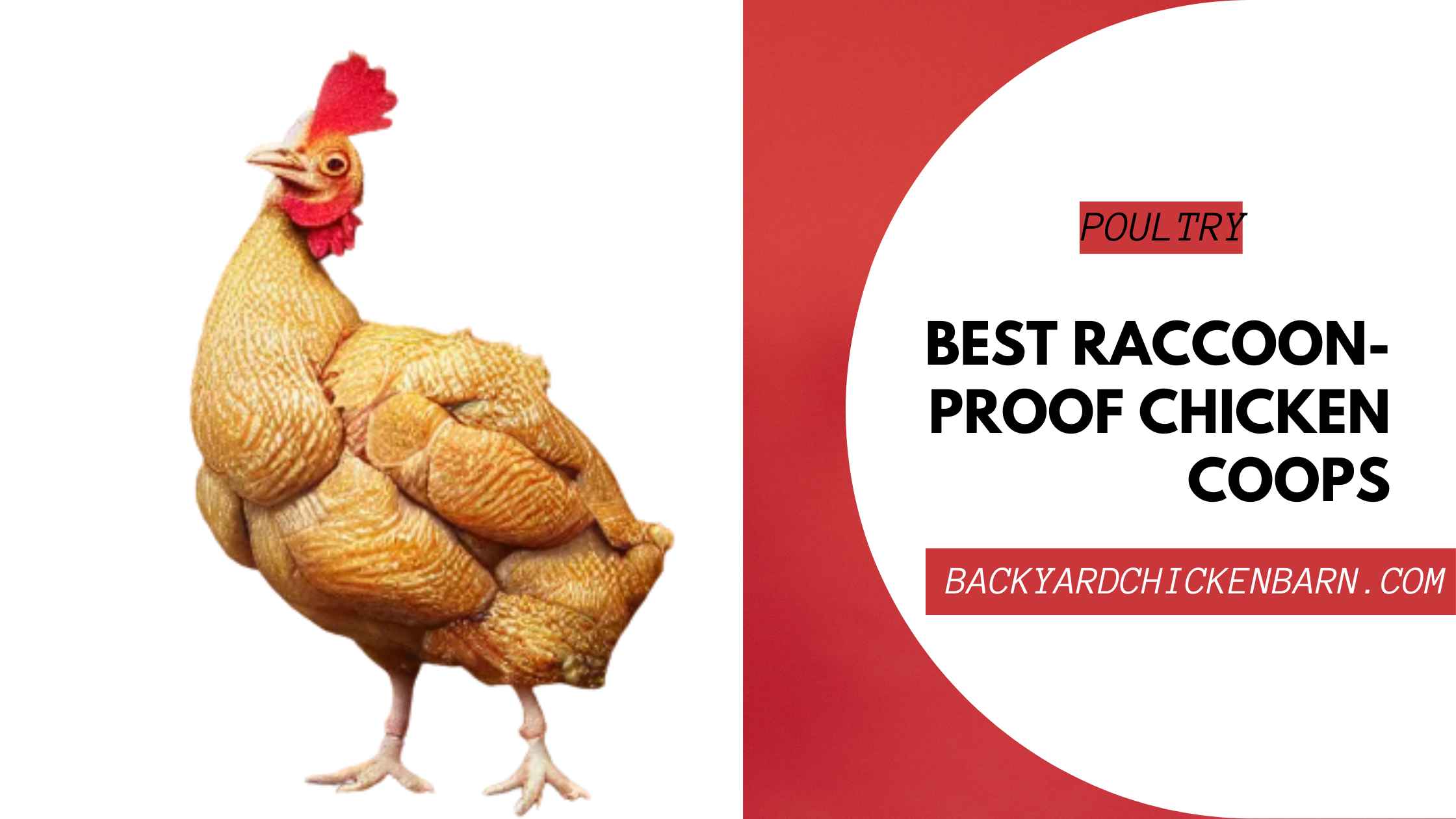OUR SELECTION – Best Raccoon-Proof Chicken Coops
Chickens, with their gentle clucking and serene demeanor, are a joy to many backyard farmers.
Yet, this peace can be shattered with a visit from a raccoon, one of nature’s most dexterous and persistent predators.
Ensuring your chicken coop is raccoon-proof is imperative to maintain the safety of your flock. Here’s a guide to selecting the best raccoon-proof chicken coops and some features to consider.
SHOP RACCOON-PROOF CHICKEN COOP ON AMAZON
Key Features of Raccoon-Proof Chicken Coops:
- Robust Construction: The best raccoon-proof coops are made of sturdy materials, such as thick wood or metal, which are tough for raccoons to tear apart.
- Secure Locking Mechanisms: A simple latch won’t do. Raccoons have nimble fingers, capable of unlocking many basic latches. Opt for a coop that features a complex latch system, perhaps even one that requires two steps to unlock.
- Wire Mesh: If your coop has windows or ventilation openings, ensure they are covered with a tight wire mesh, preferably hardware cloth. This type of mesh has smaller gaps that raccoons can’t easily reach through, unlike regular chicken wire.
- Raised Coop Design: A coop that is elevated off the ground can be more challenging for raccoons to access, especially if it has a secure ramp mechanism.
- Protected Nesting Boxes: Ensure that the coop’s nesting boxes, where hens lay their eggs, are especially secure, as these are prime targets for raccoons.
- No External Perches: Raccoons can use external perches as leverage points to pry open windows or doors, so it’s best to avoid them.
Top Raccoon-Proof Chicken Coops:
- Fort Knox Chicken Coop: As the name suggests, this coop is built like a fortress. With double-locked doors and a reinforced structure, it’s practically impenetrable.
- Elevated Haven Coop: This raised coop keeps chickens out of reach. The solid metal latches and hardware cloth make it a secure choice.
- Secure Nest Coop: Designed with nesting boxes in mind, this coop has additional protection around these vulnerable areas, making it harder for raccoons to snatch eggs.
- Guardian Metal Coop: Made entirely of metal, including the floor, this coop offers an added layer of security against raccoons and other predators.
- SafeRoost Premium Coop: This coop combines all essential features of a raccoon-proof coop, from a dual-latch system to a sturdy construction, ensuring maximum security.
Additional Tips:
- Regularly Inspect: Even the best coops can suffer from wear and tear. Regularly inspect your coop for any vulnerabilities or damage that might provide raccoons with an entry point.
- Supplementary Measures: Consider additional deterrents like motion-activated lights, noise machines, or even electric fences to further keep raccoons at bay.
- Keep the Surrounding Area Clean: Raccoons are attracted to food. Ensure there are no leftover feed or treats around the coop. Use secure containers for feed storage.
Remember, while a high-quality coop can go a long way in protecting your chickens from raccoons, a combination of measures is the best strategy.
With the right coop and additional precautions, you can sleep soundly, knowing your chickens are safe.
ALSO SEE: Best Large Chicken Tractors

FAQs on Raccoon-Proof Chicken Coops
- Q: Can raccoons open slide bolts? A: Yes, raccoons are quite dexterous and can open many types of slide bolts. It’s best to use complex latches or even padlocks on your coop.
- Q: How high can raccoons climb? A: Raccoons are excellent climbers and can climb over 10 feet easily. Ensure coops are secured even if they are raised.
- Q: Is chicken wire enough to keep raccoons out? A: No, raccoons can easily tear through or reach through chicken wire. Hardware cloth is a more secure option.
- Q: How can I make my existing coop more raccoon-proof? A: Strengthen weak points, replace chicken wire with hardware cloth, and implement complex latch systems.
- Q: Are motion-activated lights effective against raccoons? A: They can be a deterrent, but shouldn’t be the sole protection method. Some raccoons may become desensitized over time.
- Q: Can raccoons dig under a chicken coop? A: Yes, raccoons can dig. Burying the coop’s perimeter with hardware cloth can help prevent this.
- Q: Do ultrasonic repellers work against raccoons? A: Results are mixed. They might deter some raccoons but aren’t foolproof.
- Q: Can raccoons break through wood? A: While they may struggle to break through thick, solid wood, they can exploit weak points or gaps in wooden constructions.
- Q: Should I get a guard dog for my chicken coop? A: Dogs can be effective deterrents for raccoons. Ensure the dog is trained and familiar with the chickens.
- Q: How often should I inspect my coop for vulnerabilities? A: Ideally, inspect it weekly or after any significant weather events.
- Q: Do raccoons attack chickens during the day? A: Raccoons are nocturnal, so attacks are more common at night. However, they can venture out during the day, especially if hungry.
- Q: Can I use electric fences against raccoons? A: Yes, electric fences can be a very effective deterrent against raccoons.
- Q: How do I clean up after a raccoon attack? A: Ensure safety first. Repair any damage, clean up the area, and disinfect as needed.
- Q: Are raccoons deterred by human scent? A: Not reliably. While some may be cautious initially, urban raccoons especially are quite accustomed to human scents.
- Q: Can I use traps for raccoons? A: It’s an option, but you must follow local regulations and ensure humane treatment of the trapped animal.
- Q: How can I tell if a raccoon is trying to get into my coop? A: Look for signs like digging, scratch marks, damaged latches, or scattered feed.
- Q: Why are raccoons attracted to chicken coops? A: They offer potential food sources: chickens, eggs, and feed.
- Q: Can I use alarms to scare off raccoons? A: Yes, noise can be a deterrent, but raccoons may become accustomed to it over time.
- Q: Do raccoons hunt in packs? A: Typically, raccoons are solitary, but it’s not uncommon to see mothers with their kits.
- Q: Are there specific breeds of chickens that can defend against raccoons? A: While some breeds might be more aggressive, no chicken breed can reliably fend off a raccoon.
- Q: Will raccoons return after a failed attempt? A: Yes, raccoons are persistent and may return multiple times if they believe there’s a food source.
- Q: Can raccoons open twist latches? A: Raccoons have dexterous paws. While twist latches might be trickier for them, it’s not impossible for them to figure it out.
- Q: Do raccoons have a specific breeding season? A: Yes, raccoons typically breed between January and June, with peak activity in March and April.
- Q: Will scarecrows deter raccoons? A: Not effectively. Raccoons will quickly learn that they pose no threat.
- Q: Are there natural repellents for raccoons? A: Some suggest using ammonia or cayenne pepper, but results can vary.
- Q: Is it safe to eat eggs after a raccoon has been in the coop? A: It’s best to discard any eggs if you suspect a raccoon has been in the coop due to potential contamination.
- Q: Can a raccoon transmit diseases to chickens? A: Yes, raccoons can transmit diseases like avian flu or parasites to chickens.
- Q: Is it legal to shoot raccoons? A: This depends on local regulations. Always check with local authorities before taking such actions.
- Q: How can I make my chicken run raccoon-proof? A: Use hardware cloth instead of chicken wire, bury barriers below the ground, and use top netting to prevent them from climbing in.
- Q: Do raccoons eat chicken feed? A: Yes, raccoons are omnivorous and will eat chicken feed if they have access to it.
- Q: How can I deter raccoons from my property altogether? A: Secure trash cans, remove food sources, use repellents, and consider motion-activated sprinklers.
- Q: Can raccoons climb over smooth surfaces? A: They have difficulty with very smooth, vertical surfaces but are excellent climbers in general.
- Q: Do raccoons have natural predators? A: Yes, raccoons have predators like coyotes, bobcats, and owls, but in urban settings, these predators might be rare.
- Q: Can noise machines deter raccoons? A: They can initially, but raccoons may get used to the noise over time.
- Q: Are there any plants that deter raccoons? A: While no plants are guaranteed to repel raccoons, some claim that plants with strong scents like mint can deter them.
- Q: How fast can raccoons run? A: Raccoons can run at speeds up to 15 mph when threatened.
- Q: Do raccoons hibernate in winter? A: Raccoons don’t truly hibernate, but they can become less active in colder months.
- Q: Can raccoons swim? A: Yes, raccoons are strong swimmers and are known to hunt in water.
- Q: Should I relocate a raccoon if I catch it? A: Relocating wildlife can cause more harm than good and might be illegal in some areas. Always check local guidelines.
- Q: Is there a specific time of night when raccoons are most active? A: Raccoons are nocturnal and most active during the night, especially during the hours of sunset and sunrise.


